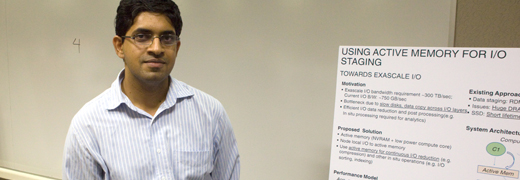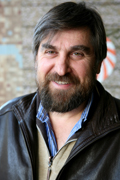Intern Profile – Sudarsun Kannan

Intern Sudarsun Kannan.
This is a series of profiles featuring interviews with some of this year's crop of summer interns at HP Labs.
We continue the series with an interview with Sudarsun Kannan who was recruited by the Intelligent Infrastructure Lab.
Sudarsun Kannan grew up in small towns all over India, where his father worked as an expert in rural banking. After high school, Kannan majored in computer science at the Sairam Engineering College at Anna University in Chennai, India. He then moved to Georgia Tech where he studied for a master’s degree in computer science and where he’s now a second year PhD student. This summer, Kannan has been working at HP Labs with researcher Dejan Milojićić in HP’s Intelligent Infrastructure Lab. “I’ve also gained a new interest in cycling since coming to California,” he adds. When he’s not working or cycling, Kannan’s a big sports fan, following tennis and cricket in particular.
HP: What have you been working on this summer?
I’ve been working on high-performance computing, looking at how it can benefit from using non-volatile memory chips. I’m asking what would it require from software to use these chips and how can we get the hardware and software to work together better to further improve performance? To do that we first had to build an emulator framework that supports high-performance applications, because nothing like that existed already. Then we created a set of benchmarking applications to run on it, which allowed us to measure how we were doing.
HP: Can you share any results?
Well, we’ve seen i/o (input/output) performance improve by around 300% for micro benchmarks. We’ve also been testing the impact of that i/o improvement on the performance of some benchmarks applications as a whole and found that we’ve improved that by up to 60%.
HP: What inspired you to apply for your internship?
I’d already been working with non-volatile memory in graduate school when I met Dejan at a conference and explained to him what I was trying to do. There aren’t that many people working in this area yet, because it’s an emerging technology with almost no hardware to work with. So it was great to find someone willing to work in that space. He told me about the internship opportunity and I thought it would be exciting, so I applied for it.
HP: What have you learned about your broader research field while you’ve been here?
I’ve been able to see people working on aspects of non-volatile memory that I hadn’t thought about before. It’s reinforced my impression that it’s going to be an important technology in the future and that it has a lot of potential as a research subject. Before I got here, I thought it was mostly a question of developing the hardware and that software engineers would just be able to make use of the new hardware capabilities. But now I see how software can be improved to work better with the new hardware too.
HP: Is your work here going to influence your PhD thesis work?
I think so. Until now, I’ve been focusing on small systems like mobile devices or small sets of servers. But after learning more about the supercomputing environment, where the number of cores can be up to 100,000, I’ve started thinking about the challenges of working with larger, high-performance systems. I’ll probably want to keep looking at both, because both have a lot of potential.
